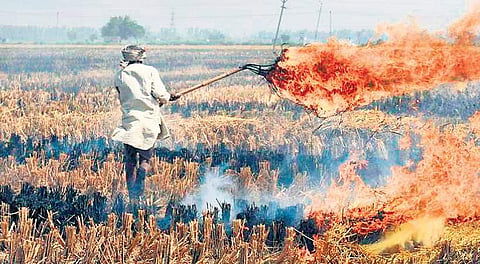

CHANDIGARH: At a time when the severe air pollution in Delhi and surrounding areas is being blamed on stubble burning, Punjab has taken the biomass power route to solve the issue. The government will soon set up 14 biomass projects in the state which will produce power and CNG from the crop residue.
Punjab produces 17.72 million tonnes of paddy straw annually.
Sources in the Punjab Energy Development Agency (PEDA) stated that already 10 biomass projects have been completed and commissioned in Muktsar, Ferozepur, Hoshiarpur, Mansa, Moga, Patiala and Jalandhar districts with a total capacity of 73.50 MW. The projects will require 0.55 million ton of paddy straw per year.
Another four biomass projects with a capacity of 61 MW are under execution in Fatagarh Sahib, Ferozepur and Faridkot districts and will consume 0.55 million tons of straw. Ten other BIO-CNG, Bio-Ethanol and Bio-Coal projects are in pipeline in various parts of the state which will consume 0.92 million tons of straw.
"Keeping in view the surplus availability of straw, it was decided to set-up five more biogas plants with a capacity of 24,000 cum raw biogas per day from each plant. One lakh tonnes of straw will be consumed in these three plants," said an official of PEDA, adding that all the plants in the pipeline will be completed by 2021-22.
The state government has already received three e-bids, the official further said.
According to the state agriculture department, 49,157 cases of stubble burning have been reported in Punjab so far this year against 48,604 cases last year till the same period. The highest farm fires were in Sangrur (6,606) followed by Bathinda (5,549) and Ferozepur (4539).
Punjab Police has registered cases against 1,630 farmers and arrested and bailed out 1327 till October 16. In all, 3,200 police patrolling teams along with 1,375 squads from the revenue department have been assigned to catch those resorting to stubble burning.
Central Pollution Control Board member secretary Prashant Gargava said: "The crop residue burning has contributed about 44 percent of pollution to the national capital. Now, we have created a forecast model that will predict pollution at least a week in advance. That will help us in our response action plan as to what additional measures are required to be taken. We have identified hot spots and also deployed our teams to provide real-time information. We have also tied up with IIT-Delhi and made 15 day plans on the areas to focus on."